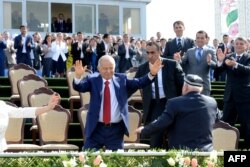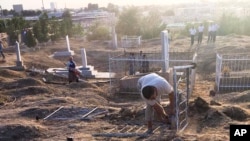Uzbekistan's long-time leader, Islam Karimov, was buried in his birthplace of Samarkand Saturday.
Funeral rites were performed in Registan Square in the ancient Silk Road city by a mufti who said that "Islam Karimov served his people." Hundreds of men attended the burial.
Karimov's coffin, covered in intricate, colorful tiles and aqua cupolas, was buried in the city's Shah-i-Zinda cemetery.
Thousands of people lined the streets of the capital of Uzbekistan, Tashkent, earlier Saturday to pay final respects to their leader as his funeral procession passed by.
The government announced the authoritarian ruler's death Friday, ending days of speculation about whether Karimov was still alive following a massive stroke. Uzbek authorities said the 78-year-old ruler had been in a coma for days. He died one day after the Central Asian country's independence holiday.
Karimov had been in power for more than 25 years.
Karimov's younger daughter, Lola Karimova-Tillyaeva, mourned her father in social media messages: "He has left us. ... I am struggling for words. I can't believe it myself."
"May God show His mercy to him," she wrote in Uzbek on Facebook. Her thoughts drew thousands of responses.
Only leader since independence
Karimov, the only leader Uzbekistan has known since it became an independent nation following the collapse of the Soviet Union, crushed all opposition during his time in power, and he had not groomed anyone to take over after him. Analysts said they were concerned that the largest and most powerful Central Asian nation could face prolonged infighting, and they also warned that Islamic radicals could try to exploit uncertainty in Tashkent, the capital.
The solemn official announcement of the president's death did not make clear who would rule the country in the future. As stipulated by the Uzbek constitution, the speaker of the senate, Nigmatilla Yoldoshev, is "interim president."
Prime Minister Shavkat Mirziyoyev was named chairman of the commission organizing the state funeral — a development seen by some as an indication he would be one of the contenders to succeed Karimov. Yoldoshev, deputy chairman of the funeral commission, is not seen as a likely candidate to take power permanently.
From the Kremlin, Russian President Vladimir Putin sent his condolences for the "heavy loss" Uzbekistan suffered. Russian Prime Minister Dmitry Medvedev will lead Moscow's delegation at the funeral.
Alexei Pushkov, head of the Russian parliament's foreign affairs committee, told reporters that Karimov's passing "may open a pretty dangerous period of unpredictability and uncertainty in Uzbekistan."
President Barack Obama said the United States reaffirmed its support for the people of Uzbekistan "at this challenging time."
'New chapter in its history'
Obama's statement, issued late Friday before he left on a flight to Hangzhou, China, for a summit meeting of Group of 20 government leaders, said: "As Uzbekistan begins a new chapter in its history, the United States remains committed to partnership with Uzbekistan, to its sovereignty, security and to a future based on the rights of all its citizens."
Putin also will be at the summit of the G-20, the world's richest nations, and he has already signaled that he hopes to engage in talks on geopolitical issues with the other world leaders there.
Turkey announced Karimov's death to the world hours before it was confirmed in Tashkent.
Prime Minister Binali Yildirim sent a message of condolence to the Uzbek people; the two countries have extensive ethnic, cultural and linguistic ties.
Uzbek authorities said they consulted with physicians from Russia, Germany, Finland and Monaco as the gravity of Karimov's medical situation became clear. The president's daughter said the cerebral hemorrhage that led to his death occurred August 27.
A senior official of Amnesty International said the rights group was not optimistic that Uzbekistan’s repressive regime would soon change its policies, marked by the use of torture against domestic opponents.
'Human rights abuses'
Denis Krivosheev, Amnesty's deputy director for Europe and Central Asia, said: "Islam Karimov’s death marks the end of an era in Uzbekistan, but almost certainly not of the pattern of grave human rights abuses. His successor is likely to come from Karimov’s closest circle, where dissenting minds have never been tolerated."
Authorities in Uzbekistan apparently had been expecting Karimov's death for days. Fragmentary reports emerging from the country told of burial preparations in Samarkand, and the closure of the city's airport for all but official flights.
An Uzbek opposition blogger based in Western Europe, Nadezhda Atayeva, said Uzbek authorities appeared to be cracking down on communication channels with the outside world.
Speaking to the Associated Press from France, Atayeva said a contact in Uzbekistan told her government officials had been ordered to turn off their telephones, and that internet service was slowing down noticeably.
Atayeva said she spoke to her contact via Skype, but as he described the situation in Tashkent, the line went dead.
VOA's Uzbek Service contributed to this report.







